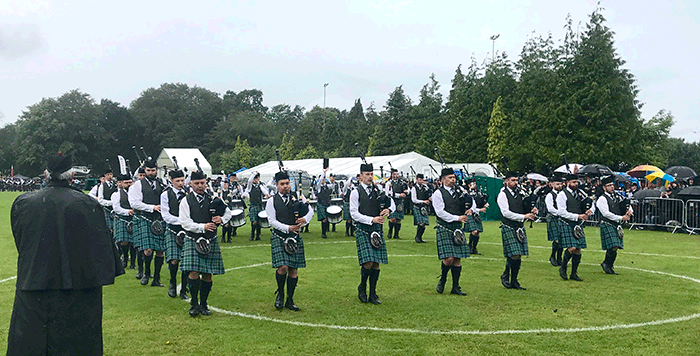
By The Editor
I listened to all of the bands in the Grade 1 contest at the Scottish Championships and they produced an astonishing level of performance given the deplorable conditions at Dumbarton. Apart from the first couple of bands (the winners Inveraray – pictured – were one of them) they played in a constant downpour, shirts sticking to arms, rain running down kilts, brogues saturated. This was the pipe band equivalent of trench warfare, the heavens the enemy, the deluge their artillery.
Over the top went the bands to meet the foe head on: hardly a gracenote missed, not a squeal, pipes blasting forth with true resonance and roar. It gladdened the heart and we listeners, not so drenched but wet all the same, determined to stay the course and offer support.
The RSPBA wisely called off the March Past and results were available circa 6pm as most bands made the journey home. To the Association’s stewards, judges and officials, plaudits all round. Days like last Saturday test resolve, but everyone showed gritty fortitude in trying circumstances.
Before the Grade 1 downpour I wanderd up to Grade 2 to hear the early bands. MacStig will have his own take later, but the winners, Closkelt, gave me four of the day’s most enjoyable minutes.
Ten pipers only and a handful of drummers, but an instantly appealing sound and three choice tunes: David Ross, Rosehall, Tulloch Castle and Cecily Ross presented with pleasing tempi, pointing and phrasing. No six-part megathons for P/M Chesney’s band, just good, melodic test pieces. They won this contest by a stretch. Have a listen here.
From there it was down to 3A where Niall Matheson was parading with his young charges in the Ross & Cromarty Pipes & Drums School. They ended up propping up the grade but I enjoyed the kids’ playing nevertheless. Niall, a double Gold Medallist, does a commendable job passing on his knowledge in the north. It is a pity we don’t hear him on the solo circuit any more.
On to the Grade 1 arena where all the best audience positions had been taken up with folding chairs, fishermen’s tent contraptions and assorted umbrellas.
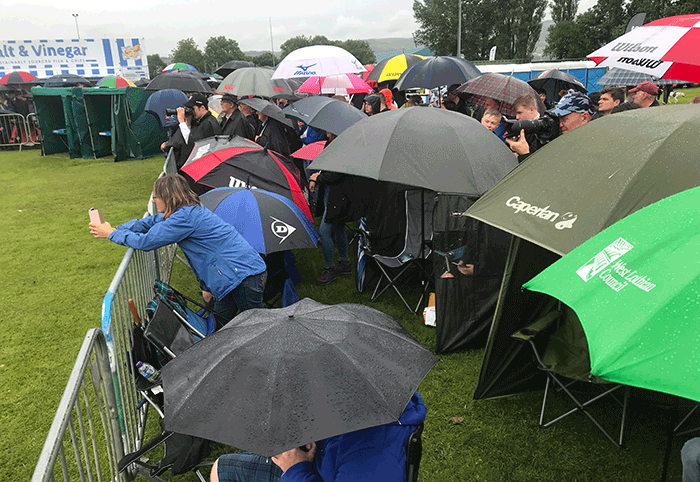
The latter were a must have, but the authorities need to do something about these tents. They are the equivalent of the towel on the holiday deckchair and take up five times as much space.
A small temporary stand should be erected at the head of the Grade 1 arena at Dumbarton. It would then afford the bands some protection from the prevailing winds coming in off the Clyde and also give listeners fairer access and elbow room.
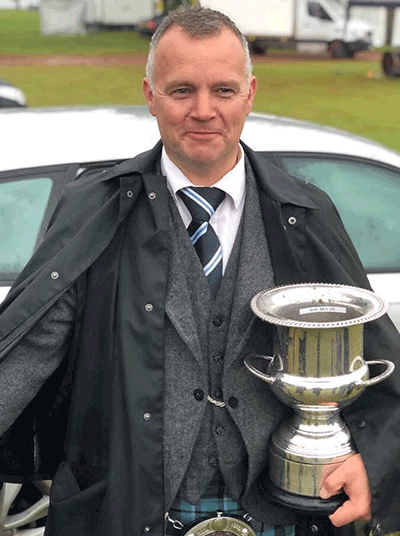
My next point is on grading. When are we going to get a Grade 1A and a Grade 1B? Cut the prizes to three in each; same judges, same admin. It is most concerning to hear very good bands like Glasgow Skye, Lomond & Clyde, Johnstone etc etc toiling away week after week for nothing more than a decent place on a summary sheet.
Not hard to instigate, but like so many things in the pipe band world a limited chance of happening. It is the development policy of the Association that needs re-thought. Bands, the controlling force, never want to raise their heads above the parapet lest it costs them on the contest field. Therefore the initiative for change and improvement has to come from the Board of Directors, the Music Board and the Adjudicator’s Panel.
Without radical action we will be stuck with 1930s circles, oversized bands, diminishing interest in minor contests, wandering ensemble judges, moribund MSRs, a G1 logjam and inadequate provision for listeners, the Worlds excepted.
The Association has made huge strides over the last 20 years proving it is not averse to change: social media for results and filming, Worlds qualifiers, new grades for Novice, MAP tune stipulations, improved adjudicator training and the placing system for judging. The next great leap forward has to satisfy the issues raised above.
To the playing. At Inverness I was forced to bend my ear to the ensemble. I did the same here. Every bass drum in the grade, with one exception, was too loud: boom, boom, boom they went like Baldrick’s poem in that scene from Blackadder IV.
They need to take a lesson in the art from the gentleman who plies the beaters for SLOT. His drum is perfectly in tune with the drones, the weight of pulse just so. Watching him on Saturday was an education.
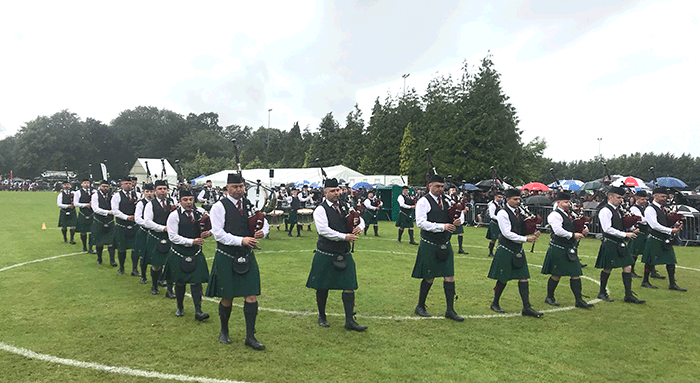
I had St Laurence first until Field Marshal came on last. SLOT were beautifully controlled and musical but P/M Parkes had power, an organ like sound from the drones and his band’s fingers are so well practised that precision technique is the default. The way they launched into the final reels had me singing in the rain.
Inveraray were equally brilliant with just as good a sound but they lost it for me on ensemble, the crashing forte of the side drums too dominant throughout. At Inverness I thought it was my stand seat that was the problem. No, this corps plays with commendable dynamics but fortissimo is overwhelming. It could cost them the Worlds.
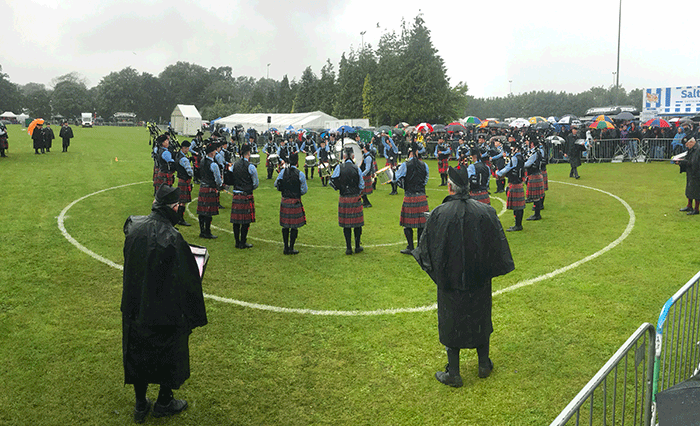
Near the end, on came Shotts. In my last report (on the Euros) I said they had been a shade lucky to make the list. Here they were unlucky not to – this despite a horrendous roar from a PA system speaker. It must have lasted at least 30 seconds. Unfazed, the band ploughed on with a fine sound and well crafted tunes proving that their young P/M, Emmet Conway, is heading for the top. In only eight months or so he has turned this band round. Look out for them at the Worlds.
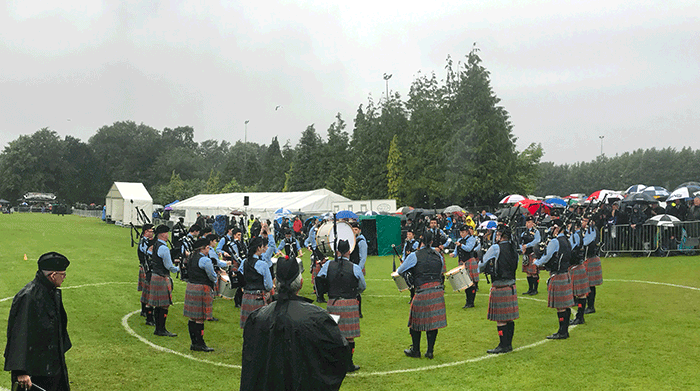
The other two places on my list went to Scottish Power (24 pipers) and Boghall. The Power displayed electric technique especially near the close, the tone just a little thin on high A for my taste. A class act otherwise and who would deny gentleman Jake his drumming title? Boghall had their quality drum sound again but the melodic content of this medley did not grab me on first hearing.
Of the other G1 bands, Fife Police need to lift the tempo of their jigs or add a slight pulsing to them; PSNI proved they are a happier band with the Medley; Johnstone (slow air?) and Lomond & Clyde are far too good for G2 but have a bit more work to do before they crack the top six. Glasgow Skye? Same, thouroughly enjoyable. Glasgow Police? A bit frenetic at the start but settled down. More attention to phrasing needed.
Given the atrocious weather it seems wrong to have to award placings after such heroics from all these bands, but it was a contest, so here’s my list:
1 FMM
2 SLOT
3 Inveraray
4 Shotts
5 Scottish Power
6 Boghall
The list that matters:
1 Inveraray
2 Scottish Power
3 FMM
4 SLOT
5 Boghall
6 Fife Police
On now to the final Major of the season at the Worlds. Extremely difficult to call this. For the first time bands will have to excel over two days in front of 16 judges – an unprecedented examination. There will be no room for safe, dull playing or imbalance pipes to drums. The band that delivers a sweet, clear but strong sound, precise technique, no errors and a melodic, measured symbiosis between percussion and bagpipe over four runs will take the crown.
- Stay tuned to PP for MacStig’s take on Grade 2. Get tickets for the Worlds here.















My apologies for sending you a comment twice, didn’t realise you got the first one without giving you an email address.
Regards
Dr McIntyre.
I think there is a gulf in every grade from top to bottom so do you have a 1A, 1B, 2A, 2B, 3A, 3B, 3C, 3D and so on, where does it stop? For a start everyone will want to play in or watch 1A and 1B will be an after thought.
The band’s in the lower half of G1 might possibly be a bit disheartened and in my opinion the first issue that needs tackled is the size of bands and putting a cap on numbers. Sadly the days of playing with your local band (not always possible) sticking together and trying to fight your way up the grade are gone. It’s a touchy subject but I don’t think it helps when there’s so many pipers and drummers moving around but it is what it is.
On the subject of diminishing interest in minor contests, times have changed and it appears to me some bands just don’t want to play at their local contests. I don’t want to pick on G1 bands but most of them have the numbers where they can afford to have players missing but some bands still choose not to go to their local contests.
Anonymous
First of all I enjoy reading your articles.
I think there is a gulf in every grade from top to bottom so do you have a 1A, 1B, 2A, 2B, 3A, 3B, 3C, 3D and so on, where does it stop? For a start most people will only want to watch or play in 1A.
I understand bands in the lower half of grade 1 will possibly get disheartened and in my opinion the band numbers issue needs tackled first. There are various reasons but i don’t think it helps pipers and drummers jumping ship on a regular basis. Sadly I think the days of playing with your local band (not always possible), sticking together and fighting your way up are gone but it is what it is.
On the subject of diminishing interest in minor contests, some might say it’s due to modern day work demands, expenses, some band members having to travel excessive distances etc. There are some G1 bands don’t support their local contests, they could probably turn up without 10 pipers and still have 14 so why not go and play? Quite simply, I don’t think they want to.
Anonymous
I’ve been saying for many years there should be a premier grade for majors.
Then G1 ,2 ,3 &4.
The gap between the top of G2 and the prize list of G1 is simply too wide to cross without a smoother route.
3 comments; 1) Agreement was very good again between judges in G1 and G2. (Whatever the RSPBA said to judges after the earlier scandal has worked).
2) I agree with splitting G1 into !A and !B. In most sports or activities, there is an elite grade for the exceptional performers, and it would make sense – the bottom half of G1 is of similar standard to the top half of G2.
3) After decades of tinkering with the Worlds Grade 1 configuration, the RSPBA have now in place a robust and demanding competition format. No more will we have the results biased by a single judge (16 judges now), no more can bands choose their favoured medley/MSR for the final, no more will bands be eliminated from playing on the Saturday. Please – no more changes with the format – leave it as proposed for many years to come.